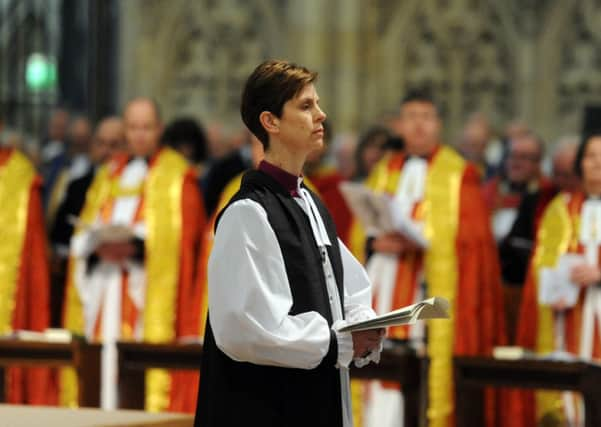John Sentamu: Church can find a way to defeat fear and suspicion


Elizabeth I, the last Tudor monarch, ruled at a time when there was fierce dispute in England about the nature of the Eucharist. She sought to achieve a breadth of understanding under what became known as ‘The Elizabethan Settlement’ saying that she refused to ‘make windows into men’s souls’. Wise words indeed!
In her reign, mutual hostility led to persecution and executions which had no conceivable Christian justification. I hope we have moved on since then. In the Church of England today, we are finding a way to accommodate Christians of differing theological convictions, particularly over women priests and bishops.
Advertisement
Hide AdAdvertisement
Hide AdLast week in York Minster I presided over the ordination of the Rt Rev Libby Lane, the first woman bishop in England. It made history. This week I shall lead another bishop’s ordination, this time of a man who, in all conscience will not ordain women to the Church’s priesthood, or take part in making them bishops. He is the Rev Philip North, who is going to be Bishop of Burnley in the Diocese of Blackburn. He and Bishop Libby Lane will both be bishops in the Church of God in England. They will hold their differences in Christian love. It is my prayer that nothing should be allowed to constrain our joy, our prayers and our thanksgiving, on their consecrations.
Consecration arrangements are in law a matter for the Archbishop of the relevant province. While they normally act as chief consecrator, and will continue to do so, Archbishops have always had the power to delegate the role on a particular occasion. This is something within their absolute discretion.
To demonstrate my respect for Father Philip’s position, I have decided to delegate part of my function at his ordination to other bishops who share his theological conviction regarding the ordination of women. That part of the service in the Minster when fellow bishops lay their hands on his head to signify his calling to join them and the blessing of the Holy Spirit, will be conducted by the Rt Rev Martin Warner, Bishop of Chichester. He will also preside at the Holy Communion on that occasion, at my invitation. Please note that I am delegating, not abdicating and this is not an indelible pattern to be adopted by me or anyone else in the future.
I know that some may regard my stance as weakness. Did not those who voted enthusiastically for women bishops, as I did, win the day? Yes, but in the Church of Jesus Christ, we are to honour one another; and I find no validation for the majority to overrule the theological convictions of a minority or triumph over them. As John Stuart Mill in On Liberty wrote, ‘If all mankind minus one, were of one opinion, and only one person were of the contrary opinion, mankind would be no more justified in silencing that one person, than he, if he had the power, would be justified in silencing mankind.’
Advertisement
Hide AdAdvertisement
Hide AdThe arrangements for Philip’s consecration were made many months ago and these arrangements were made by me in line with the five guiding principles as approved by General Synod.
It has taken two millennia for us to arrive where we are now and the Church across the world must leave room to discern the way the Holy Spirit will lead us into the future. The bishops of the Church of England and the members of its General Synod have committed themselves to this openness, to respect one another, and to work for their mutual flourishing, despite disagreement.
We live in a fractured world of winners and losers. Too many humans – all of whom are of unique worth because they bear the image of God and are loved unconditionally by him – are full of hatred and are tearing one another apart. It is my prayer that the Church of England’s gracious magnanimity, restraint and respect for theological convictions on this matter may help others to substitute love for fear and hope for despair. Yes, it can be done.